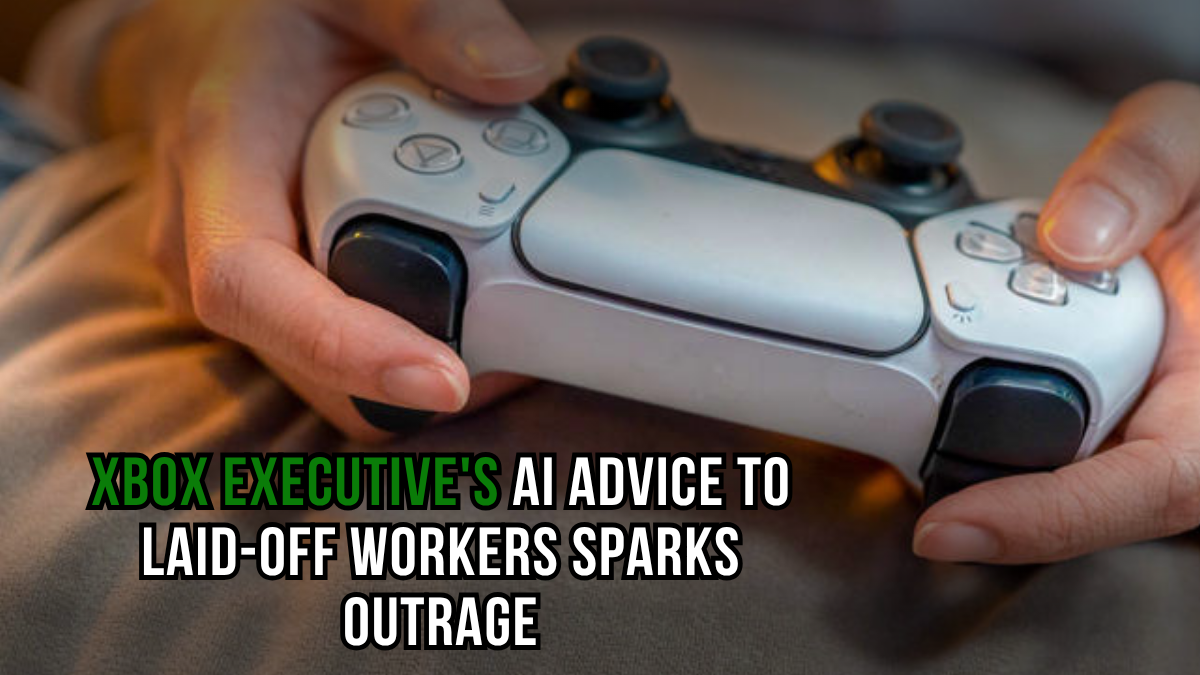Microsoft’s recent wave of layoffs has taken an unexpected turn after an Xbox producer suggested that terminated employees use artificial intelligence tools to cope with job loss. The recommendation has ignited fierce criticism across social media platforms, raising questions about corporate sensitivity and the role of AI in workplace displacement.

Matt Turnbull, an executive producer at Xbox Game Studios Publishing, posted advice on LinkedIn encouraging laid-off workers to use AI tools like ChatGPT and Microsoft Copilot to manage both practical and emotional aspects of unemployment. The post, which was quickly deleted following backlash, emerged shortly after Microsoft confirmed plans to cut up to 9,000 jobs across its divisions.
The Controversial LinkedIn Post
Turnbull’s now-deleted message acknowledged the difficulty of job cuts while promoting what he called “the best advice” under challenging circumstances. The post included specific AI prompts designed to help workers with various aspects of job searching and emotional recovery.
“These are really challenging times, and if you’re navigating a layoff or even quietly preparing for one, you’re not alone and you don’t have to go it alone,” Turnbull wrote. He then suggested using AI tools to “help reduce the emotional and cognitive load that comes with job loss.”
The executive provided detailed prompts for:
- Career planning and 30-day job search strategies
- Resume writing and LinkedIn profile optimization
- Handling impostor syndrome and building confidence
- Identifying career pivots within the gaming industry
- Managing the psychological impact of unemployment
Turnbull claimed he had been “experimenting with ways to use LLM AI tools” and wanted to share these resources with affected employees and those preparing for potential layoffs.
Swift Public Backlash
The response was immediate and overwhelmingly negative. Social media users criticized the suggestion as tone-deaf, particularly given the timing and context.
“Microsoft exec uses Microsoft platform to advertise Microsoft product that is replacing 9,000 Microsoft employees,” one user commented, highlighting the perceived irony of promoting AI tools while human workers faced termination.
Another user on X (formerly Twitter) called the advice “plain disgusting,” while others expressed being left “speechless” by the recommendation.
The criticism centered on several key issues:
- The perceived insensitivity of suggesting AI as emotional support
- The irony of promoting technology that many view as job-threatening
- The timing of the advice coinciding with major layoffs
- Questions about whether AI could provide meaningful emotional assistance
Microsoft’s AI Investment Context
The controversy gains additional significance when viewed against Microsoft’s massive investment in artificial intelligence. The company has committed approximately $80 billion to AI infrastructure and development, including partnerships with OpenAI and the creation of Microsoft Copilot.
This aggressive push toward AI technology has heightened concerns among employees about job security and the potential replacement of human roles. The juxtaposition of cutting thousands of jobs while simultaneously investing heavily in AI automation has not gone unnoticed by critics.
Microsoft’s gaming divisions, including Xbox and acquired studios like Activision Blizzard and Bethesda, have been particularly affected by recent layoffs. These cuts have impacted thousands of workers across various teams, creating an environment where discussions about AI’s role in the workplace are especially sensitive.
Gaming Industry Layoffs: A Broader Crisis
The gaming industry has experienced unprecedented job cuts throughout 2023 and early 2024. Corporate mergers, acquisitions, and cost-cutting measures have led to studio closures and mass layoffs across the sector.
Microsoft’s gaming empire has been particularly affected, with teams at Bethesda, Tango Gameworks, and other studios facing significant reductions despite the company’s strong financial position. The layoffs represent approximately 4% of Microsoft’s 228,000-strong global workforce.
Some video game projects have reportedly been affected by these cuts, with entire teams being dissolved and upcoming releases being canceled or delayed. The human cost of these decisions has been substantial, affecting experienced developers, artists, and other gaming professionals.
The Emotional Impact Question
One of the most controversial aspects of Turnbull’s advice was the suggestion that AI could help workers cope with the emotional aspects of job loss. The post included prompts designed to address impostor syndrome, build confidence, and provide psychological support during unemployment.
Mental health professionals and workplace experts have long emphasized the importance of human connection and professional support during job transitions. The suggestion that AI chatbots could replace or supplement this type of emotional assistance has been met with skepticism.
Critics argued that suggesting AI for emotional support demonstrates a fundamental misunderstanding of the human experience of job loss. The trauma of sudden unemployment, particularly in mass layoffs, typically requires human empathy and understanding that current AI systems cannot provide.
Corporate Communication Challenges
This incident highlights broader challenges in corporate communication during layoffs. The gaming industry has seen several examples of tone-deaf messaging from executives during difficult periods.
Xbox head Phil Spencer has previously faced criticism for messages that some described as saying “we’re doing better than ever, but you’re fired,” which many felt were disconnected from the reality of affected employees.
The challenge for corporate leaders lies in balancing business necessity with human sensitivity. While companies may genuinely want to help displaced workers, the methods and messaging matter significantly in how these efforts are received.
The Future of AI in Workplace Transitions
Despite the controversy, the incident raises legitimate questions about AI’s potential role in career transitions. While the timing and presentation of Turnbull’s advice were widely criticized, some aspects of using AI for job searching and career planning may have practical value.
AI tools can assist with:
- Resume optimization and keyword matching
- Interview preparation and practice
- Career path analysis and skill gap identification
- Job market research and opportunity identification
However, the key distinction lies in positioning these tools as supplements to, rather than replacements for, human support and professional guidance. The controversy demonstrates the importance of context and sensitivity when introducing AI solutions during difficult personal circumstances.
Learning from Corporate Missteps
The backlash against Turnbull’s post offers valuable lessons for corporate communication during layoffs. Companies need to consider not just the practical aspects of workforce reduction but also the emotional and psychological impact on affected employees.
Effective communication during layoffs requires:
- Acknowledgment of the human cost and emotional impact
- Clear explanation of business rationale without minimizing worker concerns
- Genuine support resources that prioritize human connection
- Sensitivity to timing and context of all communications
- Consideration of how suggestions or advice might be perceived
The incident also highlights the importance of understanding your audience and the broader context of your messaging. What might seem like helpful advice in one context can appear deeply insensitive in another.
Moving Forward Responsibly
As AI technology continues to evolve and workplace displacement becomes an increasingly relevant concern, companies must navigate these challenges with greater sensitivity and awareness. The Xbox producer’s misstep serves as a reminder that technology solutions, no matter how well-intentioned, cannot replace human empathy and understanding.
For workers facing job loss, whether in gaming or other industries, the focus should remain on comprehensive support that addresses both practical and emotional needs. While AI tools may play a role in job searching and career planning, they should complement, not replace, human support systems and professional guidance.
The controversy also underscores the need for companies to consider the broader implications of their AI investments and how these technologies might be perceived by their workforce. As automation and AI continue to reshape industries, transparent communication about these changes and their impact on jobs becomes increasingly important.
The gaming industry, like many others, faces the challenge of balancing technological advancement with human welfare. The path forward requires thoughtful consideration of both the opportunities and risks that AI presents, along with a commitment to supporting workers through these transitions with genuine empathy and practical assistance.
FAQs: Frequently Asked Questions
Q1: Why did the Xbox executive’s comments spark outrage?
A1: The comments were perceived as tone-deaf by many, as they suggested using AI tools like ChatGPT to cope with the challenges of job loss, despite the emotional and financial hardships that layoffs often bring.
Q2: What kind of backlash did the executive face?
A2: The backlash included criticism on social media platforms and within professional communities, with many accusing the executive of lacking empathy for affected workers during such a difficult time.
Q3: What was the context of the layoffs?
A3: The remarks were made in the context of Microsoft’s significant layoffs, which impacted thousands of employees across various divisions, including Xbox.
Q4: How are AI tools relevant to layoffs?
A4: AI tools like ChatGPT can assist in tasks such as resume writing, skills development, and career planning, but critics argue that these resources cannot replace genuine support and compassion during job loss.
Q5: Has Microsoft responded to the controversy?
A5: At the time of writing, Microsoft has not released a formal statement addressing the outrage surrounding the executive’s comments.
For More Information CLICK




